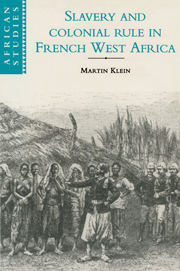Book contents
- Frontmatter
- Contents
- List of illustrations
- List of maps
- List of tables
- Preface
- List of abbreviations
- Glossary
- 1 Slavery in the Western Sudan
- 2 Abolition and retreat. Senegal 1848–1876
- 3 Slavery, slave-trading and social revolution
- 4 Senegal after Brière
- 5 Conquest of the Sudan: Desbordes to Archinard
- 6 Senegal in the 1890s
- 7 The end of the conquest
- 8 The imposition of metropolitan priorities on slavery
- 9 With smoke and mirrors: slavery and the conquest of Guinea
- 10 The Banamba Exodus
- 11 French fears and the limits to an emancipation policy
- 12 Looking for the tracks. How they did it
- 13 After the War: renegotiating social relations
- 14 A question of honor
- Appendixes
- Notes
- Bibliography
- Index
- Titles in the series
2 - Abolition and retreat. Senegal 1848–1876
Published online by Cambridge University Press: 07 May 2010
- Frontmatter
- Contents
- List of illustrations
- List of maps
- List of tables
- Preface
- List of abbreviations
- Glossary
- 1 Slavery in the Western Sudan
- 2 Abolition and retreat. Senegal 1848–1876
- 3 Slavery, slave-trading and social revolution
- 4 Senegal after Brière
- 5 Conquest of the Sudan: Desbordes to Archinard
- 6 Senegal in the 1890s
- 7 The end of the conquest
- 8 The imposition of metropolitan priorities on slavery
- 9 With smoke and mirrors: slavery and the conquest of Guinea
- 10 The Banamba Exodus
- 11 French fears and the limits to an emancipation policy
- 12 Looking for the tracks. How they did it
- 13 After the War: renegotiating social relations
- 14 A question of honor
- Appendixes
- Notes
- Bibliography
- Index
- Titles in the series
Summary
Article 1. Slavery will be completely abolished in all French colonies and possessions two months after the promulgation of the present decree in each of them. From the date of the promulgation of this decree in the colonies, any corporal punishment or sale of non-free persons will be absolutely forbidden. Article 7. The principle that the soil of France frees the slave who touches it is applied in colonies and possessions of the Republic.
Article 8. In the future, even in foreign countries, it is forbidden for any French citizen to possess, to buy or to sell slaves, and participation, either directly or indirectly in any traffic or exploitation of this kind will result in the loss of French citizenship …
Law of 27 April 1848 abolishing slaveryThe year 1848 was not the first time France had abolished slavery. It had done so in 1792, but slavery was re-established in 1802 after Napoleon came to power. With the end of the Napoleonic wars, France abolished the slave trade in 1818, but only with the greatest reluctance and at the insistence of a triumphant Britain. There was little thought of abolishing slavery itself. Furthermore it was not just the monarchy that was hostile to abolition. The Catholic Church, unlike its British Protestant counterparts, had little interest in the movement. A generation of revolution left the Church hostile to the men and ideas of the Revolution, particularly to those like Abbé Grégoire who had supported the Civil Constitution of the Clergy. There were influential people in Restoration France who favored abolition, but they organized no subscriptions and held no meetings.
- Type
- Chapter
- Information
- Slavery and Colonial Rule in French West Africa , pp. 19 - 36Publisher: Cambridge University PressPrint publication year: 1998

